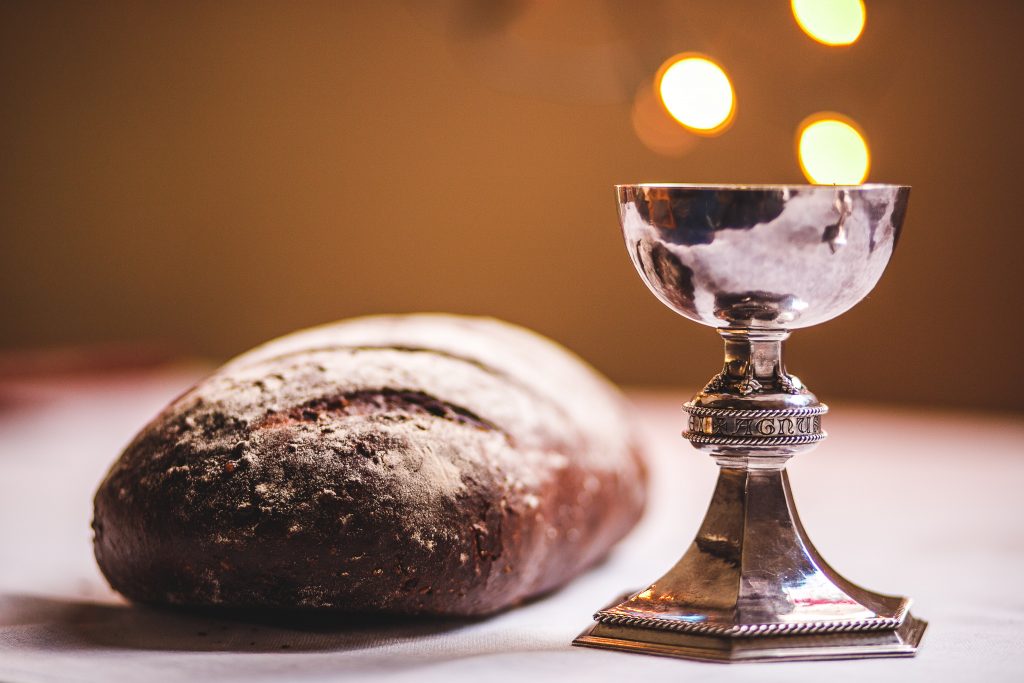Some Christians believe the sacraments function like magic wands that automatically bring about (ex opere operato) the things that they signify. For these Christians, salvation is bestowed and maintained by the sacraments. Others practically believe that the sacraments are meaningless rituals. If these Christians happen to miss the church’s yearly business meeting and the Lord’s Supper that follows, no problem. They will hopefully be at the next year’s business meeting to receive the Lord’s Supper.
Not Ex Opere Operato
Moses and Paul made it clear that circumcision of the Old Covenant did not bring about that which it signified by the act performed (ex opere operato). Moses made a distinction between those who were only circumcised in the flesh and those circumcised in the heart by the Spirit (see Lev. 26:41; Deut. 10:16, 30:6). The prophet Jeremiah likewise made this distinction (see Jer. 4:4). The apostle Paul explained it this way: “A man is not a Jew because he is one outwardly, nor is circumcision only outward and physical. No, a man is a Jew because he is one inwardly, and circumcision is a matter of the heart, by the Spirit, not by the written code. Such a man’s praise does not come from men, but from God.” (Rom. 2:28-29).
Circumcision represented inward purification and union with God’s holy people. But, just because someone was circumcised in the flesh did not mean they were circumcised in their hearts. Just because the physical children of Abraham received the outward rite does not mean they enjoyed the inward reality. Physical circumcision did not produce spiritual circumcision. Heart circumcision only takes place by the operation of the Holy Spirit: “For we are the circumcision, who worship by the Spirit of God and glory in Christ Jesus and put no confidence in the flesh” (Phil. 3:3). In the same way, being baptized and observing the Lord’s Supper do not automatically bestow saving grace on unbelievers. Many professing Christians will find out on the Day of Judgment that they never were a part of God’s people even though they regularly partook of the ordinances of the church (Matt. 7:23).
Moreover, the power of salvation is the gospel (Rom. 1:16). It is the Word of God that is sharper than any two-edged sword (Heb. 4:12). It is the Word of God that brings conviction, regeneration (1 Pet. 1:23) and sanctification (John 17:17; 2 Thess. 2:13). Without the truth of God’s Word, there is no salvation. Without the truth, there is no saving grace. Yet, no one believes that the truth automatically saves everyone who hears it (2 Cor. 4:3). The word of God is only effectual unto salvation when the Holy Spirit chooses to use it to illuminate one’s mind and heart (John 1:12). For flesh and blood cannot open anyone’s eyes to the truth (Matt. 16:17). It doesn’t take a good salesman, but the Holy Spirit to impart saving faith. And if the Bible (which is the power of God unto salvation) does not impart saving faith automatically, why would we expect the sacraments to do so?
Not Merely a Sign
This doesn’t mean, however, that the Spirit doesn’t utilize means. The Spirit operates in, by, and through the Word of God. The Spirit never functions independently of the Word of God. The Spirit inspired the written Word of God, and the Spirit illuminates the written Word of God. For faith does not come through osmosis but through hearing of the Word of God (Rom. 10:17). Because no aspect of the Christian life operates without faith, no aspect of the Christian life operates without the spiritual illumination of the Word of God.
And since the Spirit does not directly communicate the written Word to His people, earthy (earthly?) means are needed to communicate the Word of God. The invisible Spirit has chosen to use visible means as instruments to carry out His work. The Spirit used holy men to pen the Word; and the Spirit continues to use ambassadors to preach the Word. He has chosen earthen and broken vessels to reveal the glory of God (2 Cor. 4:7). Rather than directly coming to people through some ineffable and mystical experience, the Spirit has chosen to use the foolishness of preaching to save and sanctify His people (1 Cor. 1:21).
Yet preaching is not the only means that God uses to communicate the Word of God. According to the Spirit-inspired Scripture, there are five ordinary means of grace that God has given to the church to transmit the truth of Scripture: (1.) preaching/teaching, (2.) congregational singing, (3.) public reading of the Word, (4.) spiritual fellowship, and (5.) the sacraments. These five ordinary things function as channels of grace because they are God’s prescribed method of communicating the written Word of God to people. We preach the Word; we sing the Word; we read the Word; we fellowship around the Word; and, we see the Word in the ordinances. These are the means of grace because they are the prescribed method God has given the church to proclaim His Word.
Because no aspect of the Christian life operates without faith, no aspect of the Christian life operates without the spiritual illumination of the Word of God.
With this in mind, the sacraments, as physical signs of spiritual realities, are more than empty signs. They are means of grace that communicate divine truth. Though they don’t function ex opere operato, they are part of God’s ordained method in which faith and grace come. By seeing truth illustrated in the ordinances, the saints are inwardly encouraged and strengthen by divine grace. And though they don’t operate ex opere operato, they are designed to physically carryout the spiritually realities which they signify. For instance, though water baptism does not save, water baptism does function as one’s official profession of faith. And though the Lord’s Supper does not (in-and-of-itself) create fellowship with Christ and the saints, there is real spiritual fellowship with Christ and the saints when the church observes the Lord’s Supper together. The Lord’s Supper doesn’t just represent communion, it displays and facilitates communion. In this way, the sacraments are not empty or bare signs.
The Efficacy of the Sacraments Is Tied to Their Meaning
The sacraments, unlike the other ordinary means of graces, uniquely function as visible illustrations. A picture is indeed worth a thousand words, but only if the meaning of the picture is understood by those who see it. Baptism and the Lord’s Supper are pointless if their significance and meaning are unclear. Without truth, symbols are meaningless and empty. Yet, when symbolscommunicate truth, they become effective. In the same way, when the symbols/elements of the sacraments are understood, they became effective means of divine communication and grace. Consequently, the truths signified in the sacraments are paramount to their efficacy. Because there is no grace without truth, the sacraments are only as effective as they properly illustrate the truth.
A Physical Sign that Communicates More Than Just Spiritual Realities
It is easy to see how the sacraments communicate spiritual realities. The Lord’s supper, for instance, communicates the Lord’s death, the Lord’s return, and the saint’s collective communion with Christ Jesus (1 Cor. 11:17-26). These are spiritual blessings are only received and enjoyed by faith. For this reason, the signs are not the same thing as that which are signified by the signs.
Yet, spiritual realities were never meant to be divorced from physical realities. For instance, Christ physically died. Christ will physically return. We will physically eat food and have face-to-face communion with Christ in heaven at the great wedding supper (what a day that will be!). One day, our physical bodies will be resurrected and glorified; and one day the earth will be made new (2 Pet. 3:13). Then, when the heavens and the earth are made one, the physical and spiritual realities will be perfectly united (Eph. 1:10).
And because the resurrected Christ has redeemed both our souls and our bodies, the ordinances of the church are designed to speak of both physical and spiritual realities obtained by Christ. These physical signs (baptism and the Lord’s supper), along with their physical elements (water, wine, and bread), signify that our salvation is more than just something spiritual. The sacraments (with their physical elements) communicate not only our spiritual inheritance (such as regeneration and spiritual fellowship), they communicate our physical inheritance (such as the future resurrection of our bodies and our local fellowship with the saints). Thus, we don’t need to overly emphasize the spiritual realities of the Lord’s Supper to the point that we overshadow the physical realities of the Lord’s supper. The Lord’s supper speaks of our present (physical and spiritual) blessings and our future (physical and spiritual) blessings (the already, but not yet) that we have inherited in death of Jesus Christ.
The Lord’s Supper Represents Spiritual and Physical Communion
Consequently, the Lord’s supper, in particular, represents both our spiritual communion in Christ Jesus and our physical communion with the local church. It is hard for me to grasp Martin Luther’s insistence that the bread of the Lord’s super is the physical body of Jesus Christ (hoc est corpus meum). Not only does that cause the humanity and the material body of Christ to take on divine attributes (which is wrong), it implies that physical union with Christ is the cause of our spiritual union with Christ (which is also wrong). We are not united to the invisible Christ through joining a local church. We are not united to the invisible Christ by eating and drinking the physical body and blood of Jesus. It is not through flesh and blood that we enter into the kingdom of God. Rather, it is by faith alone that we are united to Christ. This union with Christ, moreover, is spiritual and invisible. Therefore, it’s not necessary that the elements of the Lord’s Supper be the actual blood and body of Christ. We don’t have to see or touch or taste the physical body of Christ to have spiritual union Christ in heavenly places (Eph. 2:6).
Yet, our spiritual union with Christ in heaven does produce a physical union with the body of Christ on earth. In that, our spiritual union with Christ is not separated from our physical union with the church. The evidence of being united to Christ is our eager desire to be united to a local church through water baptism (Acts. 2:41-42). This is why, local churches are the visible manifestation on earth of the invisible and universal church in heaven.
The Lord’s supper represents both our spiritual communion in Christ Jesus and our physical communion with the local church.
And thus, the ordinances of the church that depict spiritual truth rightly include physical and tangible elements that can be discerned with the empirical senses. These physical elements (water, bread, and wine) symbolize not only the physical and visible nature of the eternal state of glory, but also the physical and visible nature of the local church. The local church is not a mystical gathering. Its fellowship is not merely spiritual. The local church gathers together in a physical location and has personal and face-to-face communion together. A common meal eaten together by the church signifies not only the church’s spiritual communion with Christ, it signifies its physical communion with one another.
The Lord’s Supper Is Meaningless Outside the Gathered Assembly
Because the Lord’s Supper is a physical sign that includes physical elements (bread and wine) that represents spiritual and physical realities, it matters how the ordinances are physically observed by the church. That is, the church is not free to change the meaning of the Lord’s supper. The church is not free to say the bread and wine represents something else than the body and blood of Christ. The church is not free to do away with the bread and wine. And the church is not free to observe the Lord’s Supper outside of their assembled gatherings—and this for three reasons:
- The Lord’s Supper Was Given to the Church to Carry Out in Their Gathered Assemblies
The Lord’s Supper is not a personal or private ordinance. It doesn’t signify a Christian’s personal communion with God. Communion ceases to have meaning when it’s done in isolation. Christians partaking of the ordinance by themselves (or a family partaking of communion at home) is a gross misrepresentation of its meaning. The Lord’s Supper doesn’t just symbolize Christ’s death and anticipates His return, it symbolizes the church’s communion together in Christ. It was for this reason that Paul instructed the church of Corinth to wait until the whole assembly is gathered together before they observe the Lord’s Supper (1 Cor. 11:20). Eating the Lord’s Supper as a common meal together as a church body was Paul’s instruction. Paul explains the importance of observing the Lord’s Supper as a common meal: “The cup of blessing that we bless, is it not a participation in the blood of Christ? The bread that we break, is it not a participation in the body of Christ? Because there is one bread, we who are many are one body, for we all partake of the one bread” (1 Cor. 10:16-17). The importance of the Lord’s Supper being a common meal is the symbolism behind it. Just as the bread represents Christ’s body and the wine represents Christ’s blood, the common meal (one bread and one cup) represents the oneness and mutual fellowship of the body of Christ. Individuals and families partaking of the Lord’s Supper at home, therefore, are misrepresenting the meaning of the Lord’s supper.
- Unassembled Partaking of the Lord’s Supper Is Not Discerning the Lord’s Body
The Lord’s Supper is holy. It is a serious thing to mishandle it. Many of the Corinthians had fallen ill and died because of their misuse of the Lord’s Supper (1 Cor. 11:29-30). Why were their actions worthy of death? They simply observed the Lord’s Supper without discerning the Lord’s body? That is, they were partaking of the Lord’s Supper in small groups while being unconcerned with the rest of the assembly. They were fragmenting the assembly by gathering into small clusters. They were eating and drinking while other church members were doing without (1 Cor. 11:18-22). They failed to see that the Lord’s Supper was a common meal for everyone in the church. The Lord’s Supper is designed to symbolize and facilitate communion among the saints. Yet, the Corinthians were misrepresenting its significance by eating private meals in fragmented groups. And this was worthy of death because it turned the Lord’s Supper into a lie.
If we want to eat a meal together as a family or to invite a few Christians over for dinner that’s fine. But don’t call such a dinner the Lord’s Supper (1 Cor. 11:22). Paul says we have homes to enjoy dinner parties, but the Lord’s Supper is reserved for “when we come together as a church” (1 Cor. 1:18). “So then,” as Paul says, “my brothers, when you come together to eat, wait for one another—if anyone is hungry, let him eat at home—so that when you come together it will not be for judgment” (1 Cor. 11:33-34). We are to wait until the whole church is assembled before partaking of the Lord’s Supper. In other words, we are to discern the Lord’s body. By discerning the Lord’s body, we are to examine ourselves. We are to not only make sure our hearts are right with God; we are to make sure our hearts are right with the saints. If a husband can’t pray without being right with his wife (1 Pet. 3:7), and if believers can’t worship God without being in good standing his neighbor (Matt. 5:24), then individual church members cannot worship and properly partake of the Lord’s Supper without being in good fellowship with the saints. And like the Corinthians, if we partake of the Lord’s Supper without being in good standing with Christ and His church, we turn the truth of the ordinance into a falsehood. And when the church partakes of the Lord’s Supper as a unified body it demonstrates its collective unity in Christ Jesus.
In short, discerning the Lord’s body means that we are not free to partake of the Lord’s Supper outside of physical fellowship and communion of our local church. The church breaking into smaller groups and partaking of the Lord’s supper, or families taking the Lord’s Supper at home, is a misrepresentation of the meaning of the Lord’s supper.
- Without the Gathered Assembly, the Lord’s Supper Becomes a Meaningless Sign
Again, the sacraments represent both spiritual and physical realities. The Lord’s supper, for instance, doesn’t just signify the physical feast that God’s people will one day enjoy together with Christ in heaven, it also signifies (and facilities) the present communion that church members already enjoy with one another in Christ Jesus. And if this is a vital part of the significance, purpose, and efficacy of the Lord’s supper, then the church is not free to alter its meaning and purpose by observing it outside of its gather assemblies. Lies, for instance, are never (directly) used by the Spirit to bestow faith and grace. Lies and error are the instruments of Satan. If the Lord’s Supper is going to function as a means of grace, its symbolism must be demonstrated by the manner its carried out. The truths that the Lord’s Supper is designed to display must be communicated in both the elements and mode of its administration. What does the body represent? What does the wine represent? What does the one bread and one cup represent? It is only when we know the answers to these questions will the Lord’s Supper be an effectual means of grace. And if we add additional elements to the Lord’s Supper other than bread and wine, then we are adding to the Word of God. And if we alter how we observed the Lord’s supper, we are altering its meaning. And, consequently, if we alter its meaning, we are undermining its efficacy. For example, as a Baptist, I don’t see how sprinkling infants properly signifies a believer’s death and resurrection in Christ Jesus (Rom. 6:3-4). How does sprinkling communicate being buried (immersed) into Christ? And likewise, I don’t see how the Lord’s Supper can properly signify the church’s spiritual and physical communion together if it is observed outside of the assembly of the saints. In short, once we alter the elements or mode of the Lord’s supper, we are altering its meaning and efficacy.
When the church partakes of the Lord’s Supper as a unified body it demonstrates its collective unity in Christ Jesus.
Conclusion
The Lord’s Supper is not designed to be a virtual meal that assimilates actual communion and fellowship with the body of Christ. Fellowship and communion with the saints requires the local church assembling together. Anything less than a common meal partaken together in the spiritual presence of Christ and the physical presence of the saints is not the real thing. Being away from our gathered assemblies and away from Lord’s Supper should be difficult. During this time, we should grow in our appreciation of our gathered worship services and long to observe the Lord’s Supper with the assembled church. Let’s not seek to minimize our exile from one another by creating a cheap and meaningless and ineffectual substitute.

















